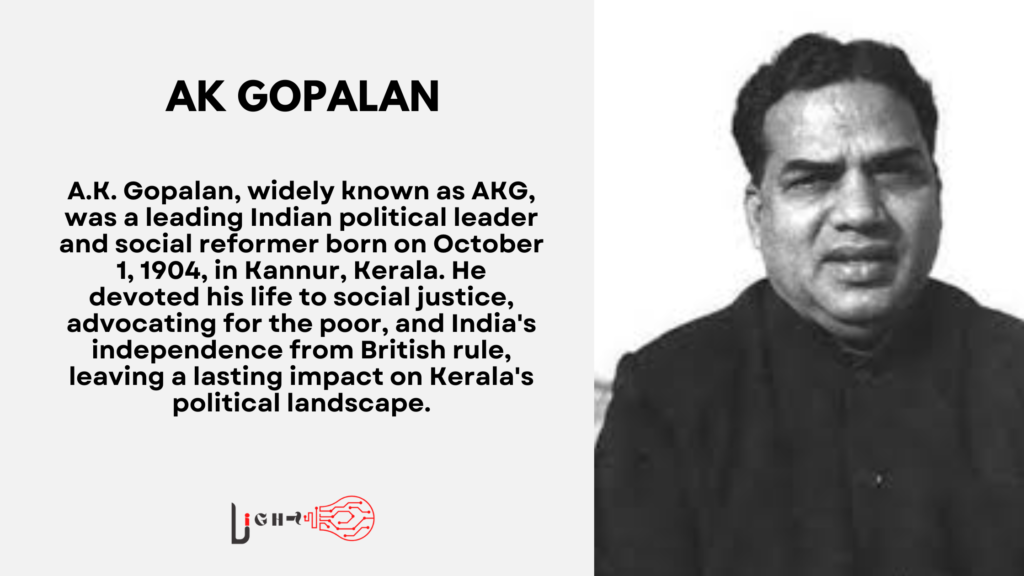A. K. Gopalan, popularly known as AKG, was one of India’s most prominent political leaders and social reformers. Born on October 1, 1904, in Kannur, Kerala, AKG dedicated his life to the fight for social justice, the rights of the poor, and the independence of India from British colonial rule. He became a towering figure in Indian politics, especially in the state of Kerala, where his legacy continues to influence the socio-political landscape.
Early Life
A. K. Gopalan was born into a modest family and initially worked as a school teacher. His exposure to the harsh realities of social inequalities and poverty in rural Kerala led him to question the existing social structures. He joined the Indian National Congress in the 1920s, drawn to the party’s nationalistic fervor and its commitment to securing India’s independence. During this time, AKG actively participated in the freedom struggle, leading protests, organizing strikes, and spreading awareness about the injustices of British rule.
Role in the Indian Independence Movement
AKG became a significant figure in the Indian freedom movement, often facing imprisonment for his actions. He participated in the Civil Disobedience Movement, the Quit India Movement, and various other nationalist campaigns. His dedication and leadership were instrumental in mobilizing the masses, especially in Kerala. AKG’s commitment to non-violent protests made him a respected figure among his peers and the public. However, it wasn’t long before AKG’s ideological journey began to shift towards more radical means of achieving social justice.
K Karunakaran: The Man Who Shaped Kerala’s Political Landscape
To know more click here:https://light.vintbit.com/kerala-history/k-karunakaran-political-leader/
Transition to Communism and the Founding of CPI
As AKG became increasingly aware of the limitations of the Indian National Congress in addressing the economic disparity and class exploitation in India, he moved towards socialist and Marxist ideologies. In the late 1930s, he became one of the founding members of the Communist Party of India (CPI). His decision to join the CPI was motivated by his belief in Marxist principles of equality, workers’ rights, and the abolition of poverty.
AKG quickly became one of the CPI’s most influential leaders, focusing on organizing peasants, workers, and the oppressed sections of society. He played a crucial role in movements that demanded land reform and labor rights, making him a beloved figure among Kerala’s working class and peasantry. His leadership helped propel the Communist movement in Kerala, where it continues to have a strong presence today.
Parliamentary Career
AKG’s political career took a significant turn when he was elected as a member of the first Lok Sabha (Indian Parliament) in 1952. He was a member of parliament for more than two decades, representing various constituencies in Kerala. As a parliamentarian, AKG was known for his fiery speeches and his unwavering commitment to the rights of the working class. He consistently fought for policies that would uplift the poor, improve labor conditions, and address the needs of marginalized communities.
One of his most notable contributions as a parliamentarian was his advocacy for land reforms in Kerala. His efforts led to significant changes in land ownership patterns, benefiting thousands of landless peasants. AKG was also a vocal critic of unjust government policies and did not shy away from holding those in power accountable, regardless of their political affiliations.

Legacy and Contributions
A. K. Gopalan’s contributions to Indian politics and society are vast and far-reaching. He was not just a politician but also a social reformer who worked tirelessly to bridge the gap between the rich and the poor. His vision for an egalitarian society where the rights of workers and peasants are protected continues to inspire leftist movements in India.1
His life is also a testament to the power of perseverance and commitment to one’s ideals. Despite facing numerous arrests, long periods of imprisonment, and political opposition, AKG remained steadfast in his pursuit of a more just and equal society.
Conclusion
A. K. Gopalan’s life and legacy reflect a deep commitment to social justice, the upliftment of the poor, and a relentless fight against oppression. His transition from a freedom fighter to a communist leader symbolizes the evolution of his political beliefs, shaped by his experiences with inequality and exploitation. Even today, A. K. Gopalan is revered as one of Kerala’s and India’s most influential political figures, whose contributions to the welfare of the people continue to be remembered and celebrated.

